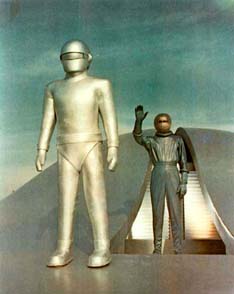Barack Obama states he will appoint the nation’s first Chief Technology Officer (CTO) . And, indeed, his own campaign even has (had?) its own CTO (see CIO-dot-com). Blogger Robert Scoble recently listed (somewhat tongue-in-cheek) the “A list” of names for the National CTO job.
Vint Cerf (as quoted by Ed Cone in his blog on CIO Insight) worries about “centralizing” technology or technology policy in the Federal government. He correctly points out that a “technology czar” would have about the same level of success as previous administration’s “energy” and “drug” and “fill-in-the-blank” czars.
But what would a “national CTO” actually DO?
Obama’s campaign website lists a potential set of duties. These include:
- More transparency in government – presumably this means the federal government. Chief Geek comment: Yes!
- Development of an interoperable wireless network for first responders. Chief Geek comment: Oh Gawd no. There are so many different groups and bureaucracies trying to do this now, vying for attention and dollars, that we’ve created a mini-first-responder-industrial complex.
- Sharing of best technology practices between government agencies. Chief Geek comment: Well, maybe. The Office of Management and Budget (OMB) of the Bush Adminstration is already and consistently scoring agencies on their management, and specifically the use of electronic government (see the latest scorecard here )
As CTO (aka Chief Geek) for the City of Seattle, I do have an opinion about this (surprise!) .
The City of Seattle does not have a CIO. To some extent, the title “CTO” instead of CIO is an historical anomaly dating from the time the position was created by the Seattle City Council in the mid-1990s. But I also head a department (Information Technology or DoIT) which largely manages infrastructure. Applications are supported by the individual departments who conduct the business of City government (providing water, electricity, transportation, policing, parks, fire and emergency medical service, etc.). As CTO, my office provides oversight and standards for the use of technology in City government, but I only directly manage about 215 of the 600 or so IT employees in the government.
In the Fedgov, not even the technology infrastructure of the government can be centralized under a CTO. The Fedgov is just too large and diverse.
I’ve previously written that government generally should not be on the bleeding edge of technology – we should take technologies pioneered and honed by the private sector, and apply them to the business of governing. In the Fedgov this is also true, with the exception of the military and homeland security, who have unique duties which will stretch the envelope of technology in new and different ways from the private sector.
So what would a national CTO actually DO? I suggest:
- Make that blob of the Fedgov more transparent. Absolutely.
- Find technologies and best practices for using technologies pioneered in the private sector and imfuse them into Federal agencies. I’ve previously listed a number of ideas about the use of Web 2.0 tech, for a specific set of examples, in government.
- Push the OMB Scorecard further and deeper with aspects of technology other than “e-gov”. The best way to push agencies to cooperate and interoperate is to score their performance. We do that with project management at the City of Seattle, and it works wonders.
- Where possible, demand, direct and lead Federal agencies to cooperate and consolidate – share web services, share infrastructure, consolidate data centers and so forth.
In terms of national (non-federal-government) leadership by this Federal CTO position, I’m a little more cautious and skeptical. I like Vint Cerf’s idea about an information technology advisory committee (PITAC). But, in general, I’d say the robust set of private technology companies (led by Seattle’s own Microsoft), the University community and the open source Internet community are doing just fine in national and worldwide technology leadership.
We do have a number of Federal agencies which appropriately regulate or support technology, for example the FCC, the Federal Trade Commission, National Science Foundation and, of course (famously) DARPA. Most of these agencies could be improved in an administration more technologically enlightened than the present one.
But we don’t really need a federal technology “czar” to “help”.




This was a thoughtful post that summarizes the state of federal transparency within some helpful government context.
So I agree we don’t need a national CTO to “help” … but do we need one to symbolize? One thing about the energy czar was that by creating the position, government was saying something about energy and drawing a lot of attention at the time. Much of what we do in government is try to move people with the power of symbolism, not just law and regulation. A CTO could sit at the table with other federal government heads and push for digital openness; the role might not ‘help,’ but could the role ‘influence’ for the good?